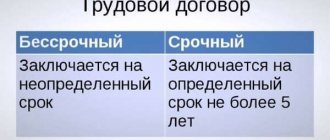Article 56. Concept of an employment contract. Parties to the employment contract
An employment contract is an agreement between an employer and an employee, according to which the employer undertakes to provide the employee with work for a specified labor function, to provide working conditions provided for by labor legislation and other regulatory legal acts containing labor law norms, a collective agreement, agreements, local regulations and by this agreement, to pay the employee wages in a timely manner and in full, and the employee undertakes to personally perform the labor function defined by this agreement and to comply with the internal labor regulations in force for this employer.
(Part one as amended by Federal Law No. 90-FZ dated June 30, 2006)
The parties to the employment contract are the employer and the employee.
The need for interpretation of the Labor Code of the Russian Federation
From a lawyer’s point of view, any industrial code, including the Labor Code, is a kind of literary work. As with every literary work, the codex has its own storyline.
For the code, the linearity of the plot is fundamentally important, that is, consistently regulated legal relations from their origin to their end.
For example, the Civil Procedure Code of the Russian Federation is distinguished by a well-developed linear plot - the tasks of the Civil Procedure Code, filing a claim, accepting a claim, consideration in the first instance, in the appellate instance, cassation, supervisory authority, execution of the decision.
The storyline of the Labor Code of the Russian Federation is very disrupted. For example, issues of termination of an employment contract are integrated into the “Employment contract” section, and, accordingly, issues related to the working regime and labor discipline are located after the articles regulating issues of termination of an employment contract.
From the point of view of casuistry, such a logical “zigzag” can be considered as a continuation of labor relations after their termination.
Article 57. Contents of the employment contract
(as amended by Federal Law No. 90-FZ of June 30, 2006)
The employment contract specifies:
surname, name, patronymic of the employee and the name of the employer (surname, name, patronymic of the employer - an individual) who entered into an employment contract;
information about documents proving the identity of the employee and the employer - an individual;
taxpayer identification number (for employers, with the exception of employers - individuals who are not individual entrepreneurs);
information about the employer’s representative who signed the employment contract and the basis on which he is vested with the appropriate powers;
place and date of conclusion of the employment contract.
The following conditions are mandatory for inclusion in an employment contract:
place of work, and in the case when an employee is hired to work in a branch, representative office or other separate structural unit of the organization located in another area - place of work indicating the separate structural unit and its location;
labor function (work according to the position in accordance with the staffing table, profession, specialty indicating qualifications; specific type of work assigned to the employee). If, in accordance with this Code and other federal laws, the performance of work in certain positions, professions, specialties is associated with the provision of compensation and benefits or the presence of restrictions, then the names of these positions, professions or specialties and the qualification requirements for them must correspond to the names and requirements specified in qualification reference books approved in the manner established by the Government of the Russian Federation;
(as amended by Federal Law No. 13-FZ dated February 28, 2008)
the date of commencement of work, and in the case where a fixed-term employment contract is concluded, also the period of its validity and the circumstances (reasons) that served as the basis for concluding a fixed-term employment contract in accordance with this Code or other federal law;
terms of remuneration (including the size of the tariff rate or salary (official salary) of the employee, additional payments, allowances and incentive payments);
working hours and rest hours (if for a given employee it differs from the general rules in force for a given employer);
compensation for hard work and work under harmful and (or) dangerous working conditions, if the employee is hired under appropriate conditions, indicating the characteristics of working conditions in the workplace;
conditions that determine, in necessary cases, the nature of the work (mobile, traveling, on the road, other nature of work);
a condition on compulsory social insurance of the employee in accordance with this Code and other federal laws;
other conditions in cases provided for by labor legislation and other regulatory legal acts containing labor law norms.
If, when concluding an employment contract, it did not include any information and (or) conditions from those provided for in parts one and two of this article, then this is not a basis for recognizing the employment contract as not concluded or for its termination. The employment contract must be supplemented with missing information and (or) conditions. In this case, the missing information is entered directly into the text of the employment contract, and the missing conditions are determined by an annex to the employment contract or a separate agreement of the parties, concluded in writing, which are an integral part of the employment contract.
The employment contract may provide for additional conditions that do not worsen the employee’s position in comparison with established labor legislation and other regulatory legal acts containing labor law norms, collective agreements, agreements, local regulations, in particular:
on clarification of the place of work (indicating the structural unit and its location) and (or) the workplace;
about the test;
on non-disclosure of secrets protected by law (state, official, commercial and other);
on the employee’s obligation to work after training for no less than the period established by the contract, if the training was carried out at the expense of the employer;
on the types and conditions of additional employee insurance;
on improving the social and living conditions of the employee and his family members;
on clarification, in relation to the working conditions of a given employee, of the rights and obligations of the employee and the employer established by labor legislation and other regulatory legal acts containing labor law norms.
By agreement of the parties, the employment contract may also include the rights and obligations of the employee and employer established by labor legislation and other regulatory legal acts containing labor law norms, local regulations, as well as the rights and obligations of the employee and employer arising from the terms of the collective agreement and agreements . Failure to include any of the specified rights and (or) obligations of the employee and employer in the employment contract cannot be considered as a refusal to exercise these rights or fulfill these obligations.
Employment contract
Employment contract N ___
with the condition of piecework wages
G. __________ "___" ________ ____
_____________________________________________________, hereinafter referred to as__
(name of employer)
“Employer”, represented by ___________________________________________, acting___
(position, full name)
on the basis of _________________________________________________, on the one hand,
(charter, etc.)
and __________________________________________, hereinafter referred to as___ “Employee”,
(FULL NAME.)
on the other hand, have entered into this agreement as follows:
1. THE SUBJECT OF THE AGREEMENT
1.1. The Employer undertakes to provide the Employee with work in the position of _________, to provide working conditions provided for by labor legislation and other regulatory legal acts containing labor law norms, a collective agreement (if any), agreements, local regulations and this agreement, to pay on time and in full The Employee receives a salary, and the Employee undertakes to personally comply with ________________, internal labor regulations in force at the Employer.
1.2. Work under a contract is the main one for the Employee (or: part-time work).
1.3. The Employee’s place of work is ___________________________, located at the address: _________________________.
1.4. The Employee’s work under the contract is carried out under normal conditions. The Employee’s labor duties are not related to performing heavy work, work in areas with special climatic conditions, work with harmful, dangerous and other special working conditions.
1.5. The nature of the work is traveling.
1.6. The Employee undertakes not to disclose secrets protected by law (state, official, commercial, other) and confidential information owned by the Employer and its counterparties.
1.7. The employee reports directly to _____________________.
1.8. In order to verify the compliance of the Employee’s qualifications with the position held and his attitude to the work entrusted to the Employee, a probationary period of ____ (__________) months is established from the date of commencement of work specified in clause 2.2 of this agreement.
2. DURATION OF THE AGREEMENT
2.1. The Agreement comes into force on the date of its conclusion by the Employee and the Employer (or from the day the Employee is actually admitted to work with the knowledge or on behalf of the Employer or his representative).
2.2. Start date: "___" ________ ____.
2.3. The contract is concluded for an indefinite period (or: for a period up to __________ in connection with ___________________________________).
3. CONDITIONS OF PAYMENT FOR THE EMPLOYEE
3.1. Under this Agreement, the Employee is provided with individual piecework wages based on piecework rates established by the Employer (tariff agreement and collective agreement dated "___"_______ ____ N __) for fulfilling a labor standard of a certain complexity (qualification) per unit of time, excluding compensation, incentives and social payments.
3.2. The amount of piecework wages depends solely on the volume, quantity and quality of work performed, regardless of the time worked.
3.3. When the Employee performs work of various qualifications, his work is paid according to the rates of the work he performs.
3.4. In cases where the Employee is entrusted with performing work that is charged below the grades assigned to him, the Employer is obliged to pay him the difference between grades.
3.5. Work on a weekend or non-working holiday is paid at least at double piece rates.
3.6. The employer sets additional payments, allowances and incentive payments. The amounts and conditions of such additional payments, allowances and incentive payments are determined in the Regulations on bonuses for the Employee (approved by the Employer “___”______ ____), which the Employee was familiarized with when signing the contract.
3.7. The employee is paid an additional payment in the amount of ________ (__________) rubles for _______________________________________________________________.
(results that are the reason for additional payment)
3.8. Downtime due to the fault of the Employer or for reasons beyond the control of the Employer and the Employee is paid in the amount of two-thirds of the Employee’s average salary.
Downtime caused by the Employee is not paid.
3.9. The Employee's wages are paid by issuing cash at the Employer's cash desk (by transferring to the Employee's bank account) every half month on the day established by the internal labor regulations.
3.8. Deductions may be made from the Employee's salary in cases provided for by the legislation of the Russian Federation.
4. WORKING HOURS. HOLIDAYS
4.1. The employee is set the following working hours: ____________ with the provision of ______ day(s) off on ______________.
4.2. Start time: ___________________________________.
Closing time: ________________________________.
4.3. During the working day, the Employee is given a break for rest and food from ____ hour to ____ hour, which is not included in working hours.
4.4. Annual basic paid leave is granted to the Employee for a duration of ____ (at least 28) calendar days.
The right to use vacation for the first year of work arises for the Employee after six months of his continuous work with this Employer. By agreement of the parties, paid leave may be provided to the Employee before the expiration of six months.
Leave for the second and subsequent years of work may be granted at any time of the working year in accordance with the order of provision of annual paid leave established by the given Employer.
The Employee must be notified by signature of the start time of the vacation no later than two weeks before its start.
4.5. For family reasons and other valid reasons, the Employee, based on his written application, may be granted leave without pay for the duration established by the labor legislation of the Russian Federation and the internal labor regulations of the Employer.
5. RIGHTS AND OBLIGATIONS OF AN EMPLOYEE
5.1. Job responsibilities of the Employee:
________________________________________________________________
(responsibilities for the relevant specialty, position)
________________________________________________________________
_______________________________________________________________.
5.2. The employee is obliged:
5.2.1. Comply with internal labor regulations, labor discipline, labor protection and labor safety requirements, and the provisions of other local regulations.
5.2.2. Treat with care the property of the Employer (including the property of third parties held by the Employer, if the Employer is responsible for the safety of this property) and other employees.
5.2.3. Immediately notify the Employer of the occurrence of a situation that poses a threat to the life and health of people, the safety of the Employer’s property (including the property of third parties held by the Employer, if the Employer is responsible for the safety of this property).
5.3. The employee has the right to:
— amendment and termination of the contract in the manner and under the conditions established by the Labor Code of the Russian Federation and other federal laws;
- providing him with work stipulated by the contract;
— a workplace that meets state regulatory requirements for labor protection and the conditions provided for by the collective agreement (if any);
— timely and full payment of wages in accordance with their qualifications, complexity of work, quantity and quality of work performed;
— rest provided by the establishment of normal working hours, reduced working hours for certain professions and categories of workers, the provision of weekly days off, non-working holidays, paid annual leave;
— professional training, retraining and advanced training in the manner established by the Labor Code of the Russian Federation and other federal laws;
— protection of one’s labor rights, freedoms and legitimate interests by all means not prohibited by law;
— compensation for harm caused to him in connection with the performance of his job duties, and compensation for moral damage in the manner established by the Labor Code of the Russian Federation and other federal laws;
— compulsory social insurance in cases provided for by federal laws.
6. RIGHTS AND OBLIGATIONS OF AN EMPLOYER
6.1. The employer has the right:
— change and terminate the contract with the Employee in the manner and under the conditions established by the Labor Code of the Russian Federation and other federal laws;
— encourage the Employee for conscientious, effective work;
— require the Employee to fulfill his job duties and take care of the property of the Employer (including the property of third parties owned by the Employer, if the Employer is responsible for the safety of this property) and other employees, and compliance with internal labor regulations;
— bring the Employee to disciplinary and financial liability in the manner established by the Labor Code of the Russian Federation and other federal laws;
— carry out certification of the Employee in accordance with the Certification Regulations in order to identify the real level of professional competence of the Employee;
— conduct an assessment of the Employee’s performance in accordance with the Regulations on Labor Performance Assessment;
— with the consent of the Employee, involve him in the performance of certain tasks that are not part of the Employee’s job responsibilities;
— with the consent of the Employee, involve him in performing additional work in a different or the same profession (position) for additional pay;
— adopt local regulations.
6.2. The employer is obliged:
— comply with labor legislation and other regulatory legal acts containing labor law norms, local regulations, and the terms of the collective agreement (if any);
— provide the Employee with work stipulated by the contract;
— pay expenses related to the performance of labor duties, including transport;
— ensure safety and working conditions that comply with state regulatory requirements for labor protection;
— provide the Employee with equipment, tools, technical documentation and other means necessary to perform work duties;
— pay promptly and in full the wages due to the Employee, as well as make other payments within the time limits established in accordance with the Labor Code of the Russian Federation, the collective agreement (if any), and internal labor regulations;
— provide for the Employee’s everyday needs related to the performance of work duties;
— carry out compulsory social insurance of the Employee in the manner established by federal laws;
— compensate for harm caused to the Employee in connection with the performance of labor duties, as well as compensate for moral damage in the manner and under the conditions established by the Labor Code of the Russian Federation, other federal laws and other regulatory legal acts of the Russian Federation;
— familiarize the Employee, against signature, with the adopted local regulations directly related to his work activity;
— perform other duties provided for by labor legislation and other regulatory legal acts containing labor law norms, a collective agreement (if any), agreements, and local regulations.
7. CONDITIONS OF ADDITIONAL EMPLOYEE INSURANCE
7.1. The employee is subject to additional insurance in the manner and on the terms established by the collective agreement and (or) local regulations of the organization (if any), agreements of the parties and the current legislation of the Russian Federation.
8. RESPONSIBILITY OF THE PARTIES
8.1. A party to a contract guilty of violating labor legislation and other regulatory legal acts containing labor law norms is liable in cases and in the manner established by the Labor Code of the Russian Federation and other federal laws.
8.2. The financial liability of a party to a contract arises for damage caused by it to the other party to the contract as a result of its culpable unlawful behavior.
8.3. In cases provided for by law, the Employer is obliged to compensate the Employee for moral damage caused by unlawful actions and/or inaction of the Employer.
8.4. Each party is required to prove the amount of damage caused.
9. TERMINATION OF THE AGREEMENT
9.1. The grounds for termination of this employment contract are:
9.1.1. Agreement of the parties.
9.1.2. Termination of an employment contract at the initiative of the Employee. In this case, the Employee is obliged to notify the Employer no later than two weeks before the expected date of termination of this agreement. The specified period begins the next day after the Employer receives the Employee’s resignation letter.
9.1.3. Termination of an employment contract at the initiative of the Employer.
9.1.4. Other grounds provided for by the labor legislation of the Russian Federation.
9.2. The day of termination of the employment contract in all cases is the Employee’s last day of work, with the exception of cases where the Employee did not actually work, but retained his place of work (position).
9.3. The Employer has the right to decide to make a compensation payment to the Employee in the amount of ___________ in the case of _____________________.
10. FINAL PROVISIONS
10.1. The terms of the agreement are confidential and are not subject to disclosure.
10.2. The terms of the agreement are legally binding for the parties from the moment it is concluded by the parties. All changes and additions to the agreement are formalized by a bilateral written agreement.
10.3. Disputes between the parties arising during the execution of the contract are considered in the manner established by the current legislation of the Russian Federation.
10.4. In all other respects that are not provided for in the contract, the parties are guided by the legislation of the Russian Federation governing labor relations.
10.5. The agreement is drawn up in two copies having equal legal force, one of which is kept by the Employer and the other by the Employee.
10.6. Before signing the employment contract, the Employee is familiar with the following documents:
Regulations on piecework wages of the Employer dated “__”____ ___ N __;
Collective agreement for ____ - ____ years;
Tariff agreement for _____ - ____ years;
_____________________________.
11. DETAILS OF THE PARTIES
11.1. Employer: __________________________________________________,
(Name)
address: ___________________________________________________________________,
TIN ________________________________, checkpoint ________________________________,
r/s ________________________________ in ___________________________________,
BIC ________________________________.
11.2. Worker: ______________________________________________________,
(FULL NAME.)
passport series _________ N ____________ issued ______________________________
____________________ “___”________ ___ city, department code _____________,
registered at the address: _____________________________________________________,
BIC _________________________________.
SIGNATURES OF THE PARTIES
Employer: Employee:
______________/______________ ______________/______________
(F.I.O./signature) (F.I.O./signature)
(m.p. <1>)
A copy has been received and signed by Employee “___” ________ ____
Employee's signature: ____________________
_______________________________
Information for your information:
<1> According to the Federal Law of 04/06/2015 N 82-FZ “On amendments to certain legislative acts of the Russian Federation regarding the abolition of the mandatory seal of business companies”, from 04/07/2015 business companies are not required to have a seal.
Article 58. Duration of the employment contract
Employment contracts can be concluded:
1) for an indefinite period;
2) for a certain period of not more than five years (fixed-term employment contract), unless a different period is established by this Code and other federal laws.
A fixed-term employment contract is concluded when the employment relationship cannot be established for an indefinite period, taking into account the nature of the work to be done or the conditions for its implementation, namely in the cases provided for in part one of Article 59 of this Code. In the cases provided for in part two of Article 59 of this Code, a fixed-term employment contract may be concluded by agreement of the parties to the employment contract without taking into account the nature of the work to be performed and the conditions for its implementation.
(Part two as amended by Federal Law No. 90-FZ of June 30, 2006)
If the employment contract does not specify the duration of its validity, the contract is considered to be concluded for an indefinite period.
In the event that neither party has requested termination of a fixed-term employment contract due to its expiration and the employee continues to work after the expiration of the employment contract, the condition on the fixed-term nature of the employment contract loses force and the employment contract is considered concluded for an indefinite period.
(Part four as amended by Federal Law No. 90-FZ of June 30, 2006)
An employment contract concluded for a specific period in the absence of sufficient grounds established by the court is considered concluded for an indefinite period.
(as amended by Federal Law No. 90-FZ of June 30, 2006)
It is prohibited to conclude fixed-term employment contracts in order to evade the provision of rights and guarantees provided for employees with whom an employment contract is concluded for an indefinite period.
(as amended by Federal Law No. 90-FZ of June 30, 2006)
Article 59. Fixed-term employment contract
(as amended by Federal Law No. 90-FZ of June 30, 2006)
A fixed-term employment contract is concluded:
for the duration of the performance of the duties of an absent employee, whose place of work is retained in accordance with labor legislation and other regulatory legal acts containing labor law norms, a collective agreement, agreements, local regulations, and an employment contract;
for the duration of temporary (up to two months) work;
to perform seasonal work, when, due to natural conditions, work can only be carried out during a certain period (season);
with persons sent to work abroad;
for carrying out work that goes beyond the normal activities of the employer (reconstruction, installation, commissioning and other work), as well as work related to a deliberately temporary (up to one year) expansion of production or the volume of services provided;
with persons entering work in organizations created for a predetermined period or to perform a predetermined job;
with persons hired to perform obviously defined work in cases where its completion cannot be determined by a specific date;
to perform work directly related to the internship and professional training of the employee;
in cases of election for a certain period to an elected body or to an elective position for paid work, as well as employment related to the direct support of the activities of members of elected bodies or officials in state authorities and local self-government bodies, in political parties and other public associations;
with persons sent by employment services to temporary work and public works;
with citizens sent to perform alternative civil service;
in other cases provided for by this Code or other federal laws.
By agreement of the parties, a fixed-term employment contract may be concluded:
with persons entering work for employers - small businesses (including individual entrepreneurs), the number of employees of which does not exceed 35 people (in the field of retail trade and consumer services - 20 people);
with age pensioners entering work, as well as with persons who, for health reasons, in accordance with a medical certificate issued in the manner established by federal laws and other regulatory legal acts of the Russian Federation, are allowed to work exclusively of a temporary nature;
with persons entering work in organizations located in the Far North and equivalent areas, if this is related to moving to the place of work;
to carry out urgent work to prevent disasters, accidents, accidents, epidemics, epizootics, as well as to eliminate the consequences of these and other emergency circumstances;
with persons elected through a competition to fill the relevant position, conducted in the manner established by labor legislation and other regulatory legal acts containing labor law norms;
with creative workers of the media, cinematography organizations, theaters, theatrical and concert organizations, circuses and other persons involved in the creation and (or) performance (exhibition) of works, in accordance with the lists of works, professions, positions of these workers, approved by the Government of the Russian Federation Federation, taking into account the opinion of the Russian Tripartite Commission for the Regulation of Social and Labor Relations;
(as amended by Federal Law No. 13-FZ dated February 28, 2008)
with managers, deputy managers and chief accountants of organizations, regardless of their legal forms and forms of ownership;
with persons studying full-time;
with crew members of sea vessels, inland navigation vessels and mixed (river-sea) navigation vessels registered in the Russian International Register of Vessels;
(paragraph introduced by Federal Law dated November 7, 2011 N 305-FZ)
with persons applying for part-time work;
in other cases provided for by this Code or other federal laws.
Article 61. Entry into force of an employment contract
An employment contract comes into force from the day it is signed by the employee and the employer, unless otherwise established by federal laws, other regulatory legal acts of the Russian Federation or the employment contract, or from the day the employee is actually admitted to work with the knowledge or on behalf of the employer or his representative.
(as amended by Federal Law No. 90-FZ of June 30, 2006)
The employee is obliged to begin performing his job duties on the date specified in the employment contract.
If the employment contract does not specify the start date of work, the employee must begin work on the next working day after the contract enters into force.
(as amended by Federal Law No. 90-FZ of June 30, 2006)
If the employee does not start work on the start day of work established in accordance with part two or three of this article, then the employer has the right to cancel the employment contract. A canceled employment contract is considered unconcluded. Cancellation of an employment contract does not deprive the employee of the right to receive benefits for compulsory social insurance in the event of an insured event during the period from the date of conclusion of the employment contract until the day of its cancellation.
(Part four as amended by Federal Law No. 90-FZ of June 30, 2006)
Who cannot be refused to sign an employment contract?
The possibility of refusing to accept a position is limited by the legislator. Refusal cannot take place if:
- in relation to the employer there is a procedural decision obliging to conclude an employment contract with the person specified in it;
- the candidate must be employed within the framework of legislative quotas;
- the employee was invited to the position according to the transfer rules and reported to the new place of work within a month. The duration of such a period is established from the date of termination of the employment relationship at the previous place of performance of professional duties;
- the employee actually began to perform labor functions even before the official registration;
- the employee was elected to the position as a result of competitive procedures.
An applicant for a position who considers the refusal to employ him to be unfounded is given the right to protect his rights in court proceedings. The decision by which the plaintiff's demands are satisfied is binding on the employer.






